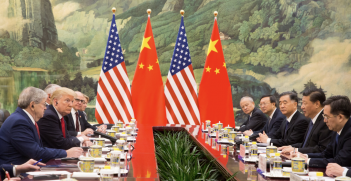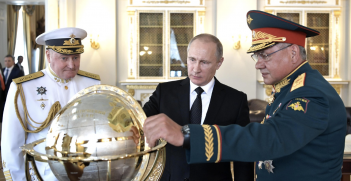Does the West have a Bombing Addiction?

The UK’s decision to conduct air strikes in Syria raises concerns over the move’s effectiveness in stamping out radical extremism.
After a marathon debate on Wednesday, Britain’s parliament authorised air strikes on the Islamic State (IS) in Syria by an overwhelming 397-223 vote. Prime Minister David Cameron’s call was challenged by Opposition Leader Jeremy Corbyn who permitted a conscience vote and 66 Labour MPs voted for the resolution. The debate was impassioned and thoughtful, with a gravitas befitting the solemn subject. There are three key takeaways.
First, it confirms the importance of the legislature as the forum of choice for debating and voting on the vital issues of the day. Internationally, the United Nations Security Council is indispensable for debating the great issues of war and peace by the appointed representatives of the nations of the world. Similarly, the people’s elected representatives should have both voice and vote in parliament before a nation goes to war.
This begs the question: if Australia’s closest allies – the UK, US and France – can debate and vote in the legislature, why exactly is Australia so backward in entrusting parliament to do the same? Are our MPs less responsible, not to be trusted, lacking in judgment and wisdom compared to their counterparts in the major Western democracies? Or is our executive more stubborn in resisting parliamentary intrusion into privileges derived from sovereigns? Former PM Tony Abbott was widely mocked for reviving British imperial titles as part of Australia’s national honours and awarding a knighthood to Prince Philip. Keeping the right to go to war as an exclusive prerogative of the executive seems far worse because it is much more consequential.
Second, flip-flopping in the choice of enemies in going to war does not inspire much confidence. While parliament voted for air strikes on this occasion, it had rebuffed Cameron’s call for strikes on President Bashar al-Assad’s forces two years ago. Setting aside self-deluding fables and fantasies, there are only three groups fighting for territory and power in Syria: the Assad regime, IS and the al-Nusra extremist rebels. There is no viable “moderate” opposition. The maze of outside interests has entangled Turkey, Iran, Saudi Arabia, Israel, the US, European powers, Russia and the Kurds in crisscrossing and fluid alliances. Their growing presence and expanding roles in the congested and contested Syrian space is an open invitation to escalation and crisis, as with the downing of a Russian bomber by a Turkish fighter plane.
Third and most importantly, it represents a dramatic escalation with all the attendant risks of unintended and perverse consequences. In particular, despite its aim of countering international terrorism, it might incite and expand terrorist attacks directed at Western targets. A day before the vote, Cameron warned that anyone voting against the authorisation was “a terrorist sympathiser”. This is about as helpful as calling all those who voted for the air strikes “terrorist enablers”. The later is in fact closer to the truth.
Mass killing morphs from criminality to terrorism when it is politically motivated and intended to produce political effects. With political violence, the political grievances underpinning them must also be examined and countered or addressed. By our policies and actions, do we create more terrorists than we kill and capture? The related question is: what would most profit the jihadis who want to recruit and motivate a growing army of angry Muslim youth to fight Westerners?
When Russia escalated its military involvement in Syria, Western leaders warned of the risks of fuelling extremism. Cameron said it would promote radicalisation and terrorism. Some drew a direct link between Moscow’s military intervention and the IS bombing of a civilian Russian plane that killed 244 people. In a BBC panel discussion, The Daily Telegraph’s Janet Daley speculated that President Vladimir Putin had possibly “incited” this terrorist attack on Russian civilians. After Paris, she wrote it would be “wicked and irresponsible” to suggest it was payback for recent French interventions in Africa and the Middle East.
Doug Bandow is among a small minority of American analysts who can connect the dots between US foreign policy and terrorist reprisals, ‘Wandering the globe bombing, invading and occupying other states, intervening in other nations’ political struggles, supporting repressive governments and killing residents for good or ill inevitably create enemies and blowback’. Although explanation does not equate to justification, he adds, ‘any government that attacks the Islamic State should realize retaliation is likely, probably against people innocently going about their lives, as in Paris’.
When Paris was attacked by terrorists, Westerners found it easy to understand why France hit back hard with military strikes on IS targets. This merely adds to the puzzle of the failure to understand why “they” want to strike at “us” when we attack them in their homelands. Following the 9/11 attacks, Chicago University’s Robert Pape compiled the first complete dataset on worldwide suicide terrorists from 1980–2003. He was struck that 95 percent of the attacks “were in response to a military occupation” by foreign troops.
The presence of Western troops on Muslim soil is a sore point for many Muslims. Western powers have toppled elected governments (Iran) and attacked secular tyrants (Iraq, Libya) but backed and armed autocratic sheikhdoms exporting the most extreme doctrines of fundamentalist Islam. Western rhetoric of democracy and human rights reeks of hypocrisy to Muslims and breeds widespread cynicism about their motives. During the parliamentary debate, the BBC website account received over 3,000 reader comments. The top-rated comment (up-voted by 907) said simply that the global fight against terrorism should start with the whole world refusing to trade with and arm Saudi Arabia, the main source of financing and backing for export-only Wahhabi fundamentalism.
Of the 350 suicide terrorist attacks in this 24-year period, just 15 percent were aimed at American targets. In a 2010 follow-up study, Pape established that in the 2004–09 years, there were 1,833 suicide terrorist attacks, 87 percent were accounted for by the stationing of foreign combat forces and 92 percent were anti-American – many of them specifically inspired by the 2003 invasion of Iraq.
In other words, far from declining, anti-US suicide terrorism increased and intensified after and in direct response to the global war on terror. The trouble with an eye for an eye philosophy, as Mahatma Gandhi noted wryly, is that soon the whole world will become blind.
Professor Ramesh Thakur is the Director of the Centre for Nuclear Non-Proliferation and Disarmament at the Crawford School of Public Policy at Australian National University. He is also a former Assistant-Secretary General of the United Nations. This article can be republished with attribution under a Creative Commons Licence.





